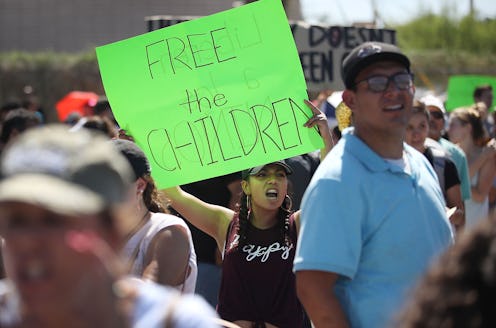News
The Number Of "Shelters" Built To Detain Migrant Kids Under 13 Is Alarming

Perhaps the most distressing part of the Trump administration's policy of separating migrant children from their parents at the U.S.-Mexico border are the children who are too young to understand what's happening. It's been unclear how many "tender age" shelters there are, but the latest Associated Press reports that there are at least three, with a fourth one possibly on the way.
"Tender age" shelters are centers built specifically for the youngest of the migrants under 12, including toddlers and babies. On Tuesday, The Associated Press reported that the three "tender age" shelters that are currently known are in South Texas.
According to The Associated Press, legal and medical workers who gained entry into these "tender age" shelters in the Rio Grande Valley chronicled playrooms that were hygienic and safe but full of hysterical, bawling toddlers and preschool-aged children. The three centers were spread out, with one each in Combes, Raymondville and Brownsville, the Associated Press reported, and the centers had been hastily transformed to accommodate very young children. The Texas Tribune also wrote that a fourth "tender age" shelter was in the works, to be set up in Houston. The shelter, previously used during the Hurricane Harvey crisis, would have the capacity to hold up to 240 children, though the idea does not sit well with Houston's Democratic mayor.
“I do not want to be an enabler in this process. I do not want the city to participate in this process,” Turner said at a press conference Tuesday, urging the state to withhold licensing of the facility, according to The Texas Tribune. “The health department has yet to provide a food permit or shelter permit. … If we don’t speak, if we don’t say no, then these types of policies will continue.”
Since the announcement of Trump's "zero tolerance" policy in May, the White House has split over 2,300 children up from their families, said federal officials on Tuesday, according to The Associated Press. As more families are caught and separated, the number of detained "tender age" children has quickly risen, leading overwhelmed officials to look for more caregivers and shelter space.
The Associated Press pointed out that the government also appealed to foster care and shelter providers for help in handling the influx of children. On top of that, the report noted that the government's Office of Refugee Resettlement was looking for caregivers who could provide services for "all ages and genders, as well as pregnant and parenting teens.” The range for "all ages" is telling; one Honduran mother told CNN that border patrol officials snatched her baby away as she was breastfeeding in a detention center.
Federal officials said they were unsure of the age grouping of the children they had in custody and couldn't confirm how many were under 2 or couldn't even talk yet. In a defense of the policy and how it's being executed, a Department of Health and Human Services official praised the condition of the "tender age" shelters.
“We have specialized facilities that are devoted to providing care to children with special needs and tender age children as we define as under 13 would fall into that category,” Steven Wagner, an official with the Department of Health and Human Services, said in the Associated Press report. “They’re not government facilities per se, and they have very well-trained clinicians, and those facilities meet state licensing standards for child welfare agencies, and they’re staffed by people who know how to deal with the needs — particularly of the younger children.”
But though the rooms may be clean and clinicians well-trained, there is no substitute for a child's parent. That sentiment has led to some unapologetic words from former government officials.
The concept of "tender age" shelters, with children too innocent to understand the international border battle they're ensnarled in, has struck at the very heart of a policy that critics deem to be cruel and inhumane. But with a fourth shelter planned, the policy may not be going away any time soon.